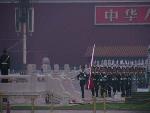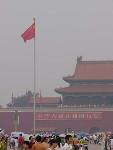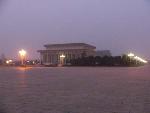- Getting around Lijiang. Dont stay in the Old Towns more than 2 days, there is nothing to do. KRISS Oct 9, 2013 05:46
- 2013 Beijing Temple Fair BENNYLAU Feb 26, 2013 03:29
- Malaysian traveling from KUL - LAX vis Shanghai PVG ZATI_DY Jan 3, 2013 20:15
The Square Awakes - Tiananmen
- Views: 3056
- |Vote: 4 0
- |Add to Favorites
- |Recommend to Friends
Raise the Red Flag
Forgive my enthusiasm, but I’ve just witnessed something that represented every reason why I came to China in the first place, and I feel inspired. China’s a tough country to get to know, and it’s easy for travellers to feel frustrated in their endeavours to get under the skin of this place. But there are times when it all seems crystal clear, when for a moment you can share something with the Chinese people, that genetic pride that can seem unfathomable to all foreigners sceptical of nationalism – the essence of what it is to feel Chinese.
Every morning at dawn, a simple ceremony is held at Beijing’s Tiananmen Square. The flag raising ceremony is so popularly attended that if you do happen to get together the resolve to get out of bed and go and see it, you’ll be amazed, as I was just now, at the crowds that gather right before the sunrise. I was on my way there almost by accident – I’d woken up in the middle of the night and had found it impossible to get back to sleep – and suddenly realised that after having spent so long in Beijing without seeing the raising of the flag, it was high time I show a little respect.
Beijing’s ring roads were empty of traffic – they’re practically blocked all day, and so it was a delight to see the broad boulevards at their most impressive, when they seemed, albeit incorrectly, to be capable of handling any number of vehicles. Coming close to the Square, the side roads were absolutely jammed with tourist busses, and as I followed the crowds in the halflight, I began to pick up the buzz – this was no special holiday or any particular day of note, this was just another morning – but the thrill that was being generated was frankly breathtaking. Some of these people had dreamed for years of coming to Beijing to witness this event – for the raising of the flag is no trivial matter: Tiananmen Square is the political, and perhaps spiritual, centre of the country, and it could be said that all other Chinese flags are a mere copy of this one. To see the flag raising ceremony at dawn in Tiananmen Square is to partake in a thoroughly serious and solemn display of respect for the mother country.
The people in the Square were already pushing for a view by the time I arrived, and it was difficult to get a good position. Perhaps it was my bad luck, but I seemed to be stuck behind the tallest people in China. Guards passed by the front of the crowds encouraging people at the front to squat, but they were largely ignored. It did nothing to dampen the mood, however, and I watched with fascination as the gathering light of morning began to flesh out the scarlet facades of the Forbidden City, Mao’s famous portrait the brightest point on the old Tiananmen Gate.
At a quarter past five, the lamps in the Square were extinguished and the humming of chatter collected and hushed into the morning murk. From beneath the portrait, right where the Emperors themselves had once paraded out from their palace, a tight row of uniformed flagsmen emerged and began to march towards the great flagpole with an icy solemnity. Under the dim of the brightening sky, the tongue of bright red carried by the leader was the most intense point of colour visible.
As they reached the flagpole, the loudspeakers boisterously began to blast China’s national anthem out across the parade, and the flag was attached to the ropes and hauled, inch by inch, to the top. Perhaps there were no rows of schoolchildren standing erect in full salute as I’ve heard can often be seen on these occasions – and perhaps the thick morning clouds and still air gave the raised flag something of a limp anticlimax – but I couldn’t help but feel enthralled. It was nothing more than the unquestioning respect shown in the deportment of the flagbearers and the crowds of fascinated spectators, a respect that I found very becoming, and something I began to feel myself as I saw the very centre of China gather itself for another day on Tiananmen Square.
In the Square
Beijing in the time of the Qing Dynasty was a massive old city surrounded by an imposing wall not unlike that which survives in Xi’an today. It grew around the great Forbidden City, the former palace of the Emperors, and the entire metropolitan plan was based on the age-old principles of feng shui, with long, straight roadways ordered around the basic north-south axis that stretched all the way from the Emperor’s throne room right down into the poor areas.
When the country entered the Socialist age, the superstitions of the past were discarded, and Tiananmen Square was constructed right in the path of the central axis in a deliberate move to obstruct the symbolic hierarchical arrangement. The Square is the ultimate social equaliser, with the Great Hall of the People, China’s seat of government, managing to appear both majestic and humble on the eastern side of the Square, and the National Museum to the west, commemorating not only the history of the great Chinese civilisation, but also the sacrifices and triumphs of the people who fought for freedom from oppression from foreigners and from tyranny in their own country. In fact it was right here at Tiananmen where the victorious Chairman Mao stood before his people after his party’s glorious accession to power and said to the cheering masses that after years of victimisation at the hands of foreign invaders, China had, at last, stood up.
Notwithstanding, the Square also has its share of tragedy. Both foreigners and local Chinese alike mourn the events following the student demonstrations in 1989, but few visitors from abroad are aware that Tiananmen Square was the site of many earlier demonstrations, notably the riots of May 1919 and of December 1935, protesting against unfair advances on Chinese territory, and the gathering of the Red Guard at the beginning of the Cultural Revolution. Tiananmen Square, if anything, is more symbolic of Chinese self-governance than it is of anything else, and visitors today will see impressive monuments and statues that celebrate the power of determined resistance that has brought China into the present day free of foreign masters.
The Chairman
The Square, of course, is the final resting place of the Great Helmsman Chairman Mao Zedong, and it was actually against his wishes that his body be preserved, as had been those of Lenin and Ho Chi Minh, for the sake of perpetual mourning ever after. But Mao was far too important even to respect his last wishes, and today millions who still love him and who are grateful to him for their freedom from foreign aggressors still flock to see his place of final rest – if that’s how being on display in a crystal coffin can be described.
The admission-free museum opens a few hours after the flag raising ceremony at 8.30am every day except Monday, and remains open until 11.30am – although on Tuesdays and Thursdays, excepting in July and August, it reopens for two hours at 2.00 in the afternoon. A huge queue weaves out from the gate – something that might appear off-putting to visitors, but in fact the movement is rapid and within minutes, visitors will find themselves directly before the gates. It’s not a good idea to be carrying any kind of bag at this point – you’ll be instructed to go back and have it stored in a repository way across the road to the south of the National Museum – and any drinks you may be enjoying will have to be surrendered. While you’re waiting in the queue, you can purchase a flower for laying in front of the Chairman’s statue (RMB3) or a souvenir booklet that contains a rare, blurry photo of the Chairman in state for one yuan.
As we filed into the hall during my visit, I found myself to be rather nervous. I’d been hot and bothered outside, but now that I stood in the cool air-conditioned museum, I wondered how I could face the great Chairman himself with my head full of such trivial thoughts. I tried very hard to stop paying attention to the attractive young woman walking next to me in the queue and watched instead as visitors, one after the other, added their flowers to the massive collection at the foot of the statue at the entrance, kowtowing as if they’d entered a temple.
Mao hadn’t want to be preserved because he didn’t want to become some kind of God – but I realised by the attitude of the crowds that they were under no impression that he was. No-one these days speaks of the Chairman as having been a perfect leader, but he still commands an awesome debt of gratitude and respect from those who are benefiting from the results of his actions today. Some of the older people in the queue would have been forced to learn Japanese nursery rhymes at their primary schools: that their grandchildren can celebrate the lullabys of their own culture is exactly the kind of liberation Mao brought to his people. I realised that the kowtowers were just grateful, and nothing more.
The line is rushed past his body, and only his face is visible in the dim light projected onto his skin. I would have loved to stand there, watching him and remembering all the things I’d learnt of him – as would have everyone in the queue, had they had the chance – but instead each of us only had a moment to look upon the face of Mao himself, and remember who they were, even me, because of what he’d done.






 Copyright © 1998-2026 All rights reserved.
Copyright © 1998-2026 All rights reserved.
1.
Aug 19, 2006 23:50 Reply
MISHEN said:
Your feelings at Tiananmen Square I can sympathise with very deeply - I myself felt similarly the first time I went there, although over time it just became, for me, a place I would cross to walk home. It's hard to go to Tiananmen Square as a Westerner without that unfinished business sitting in the back of one's mind. I prefer not to emphasise it not because I don't think it's important, but because I think a lot of foreigners regularly lecture Chinese people here and overseas about it in a manner that is frankly bullying. Everyone, Chinese and foreigner alike, resents what happens that day. My perspective as a freelance journalist is to reserve my personal opinions, and try not to press the point when I talk to people about it. That, of course, in no way means we should forget.